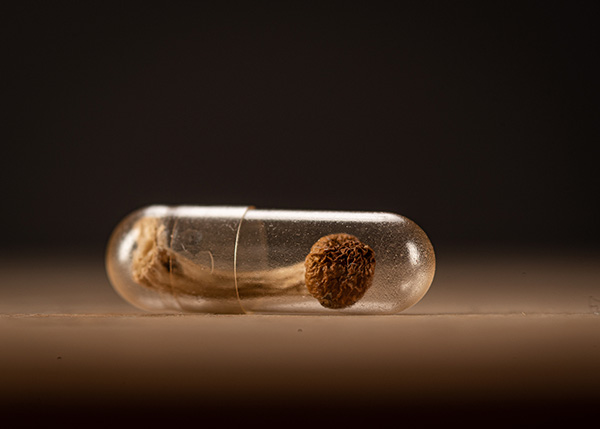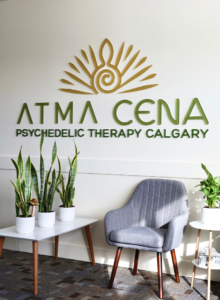Psychedelic-assisted therapy is slowly becoming a legal therapy option across the US and Canada, with psilocybin-assisted therapy leading the way. But what is psilocybin and how is it used in a therapy setting?
See US Psychedelics Regulations & Canada Psychedelics Regulations to see the current regulations in your area.
What is Psilocybin?
4-Phosphoryloxy-N, N-Dimethyltryptamine
Found in over 200 species of mushrooms, Psilocybin is an indole alkaloid that greatly resembles serotonin in structure and is rapidly metabolized into psilocin upon human ingestion. Once converted, psilocin stimulates serotonin receptors which creates alterations within perceptive consciousness. When psilocin binds to the 5-HT2A receptor, it stimulates a heightened sensory experience that includes hallucinogenic effects, synaesthesia (merging senses), shifts in perception and reorientation of spatial and chronological relationship.
Psilocybin Effects & Experience
Because there can be distortions of spatial and time-based awareness, the journeyer can explore the nature of their imagination and the recesses of their own nature. This can easily produce circumstances that connect the user to long forgotten memories and awaken a strong sense of spiritual activation. Foreign worlds, spirit beings and distant or lost relatives may all come forward along with an infinite range of potential experiences.
Due to the wide range of possibilities, guidance from experienced and trained supporters can help to create a safe environment for inexperienced and experienced users alike where any and all of the negative components of the journey can be confidently and seamlessly navigated.
How Do Psilocybin-Assisted Therapy Sessions Work?
Pre & Post-Experience Therapy Sessions
Committing to several sessions ensures participants complete appropriate pre-experience preparation and post-experience integration, which are as important as the psilocybin session itself. A fully licensed and appropriately trained psychedelic therapist will provide preparation and integration psychotherapy sessions to help you be ready and open for your psilocybin experience. They will also help you unpack your experience and get meaningful insights out of it.
Your Psychedelic Guide
A psychedelic guide (sometimes referred to as a psychedelic facilitator) in the case of psilocybin, will differ in training and experience from a psychedelic therapist. Guides will not require therapist licensure as they will not have to engage in psychotherapy with the client during the psilocybin session. They will likely have varying backgrounds ranging from breathwork practitioners to pastoral workers, personal interest psychonauts, or alternative healing professionals.
Similar to the distinction between a birth doula (guide) vs. a midwife (therapist), both roles will be supportive with the common goal of seeing clients through their experiences safely. Guides will support both the clinical staff (doctors and therapists) as well as the psychedelic therapy client.
Read more: What’s the difference between a Psychedelic Therapist & Psychedelic Facilitator
What Disorders Could be Treated with Psilocybin-Assisted Therapy?
There are several indicated opportunities for support for psilocybin-assisted therapy, including:
- Depression disorders including treatment-resistant depression
- Anxiety disorder and anxiety and depression in cancer patients
- Obsessive compulsive disorders
- Substance abuse disorders including nicotine and alcohol dependencies
- Eating disorders including Anorexia nervosa
- Depressive response to Type 2 Bipolar disorder
- Headache disorders including post-traumatic headache disorders
- Deterioration in AIDS/HIV survivors
Positive Effects of Psilocybin-Assisted Therapy
There are many recorded benefits for psilocybin-assisted therapy including:
- Expansion of awareness
- Enhanced sensitivity
- Synaesthesia
- Altered visualization
- Cognitive openness
- Extra-sensory perception
- Connection to mystical and spiritual energies
- Recalibration of beliefs
- Acceptance of things as they are
Negative Effects of Psilocybin-Assisted Therapy
Psilocybin-assisted therapy isn’t for everyone and can come with some negative effects including:
- Nausea and/or vomiting
- Restlessness
- Paranoia
- Anxiety
- Disorientation and/or dizziness
- Muscle fatigue and/or weakness
- Light sensitivity
- Impaired focus
- Irrational thinking and/or behaviour
Is Psilocybin Legal for Therapy Use?
Interested in adding psilocybin-assisted therapy into your practice?
Download the Psychedelic Basic’s Guide now for more information on how you can integrate psychedelics into your practice.




